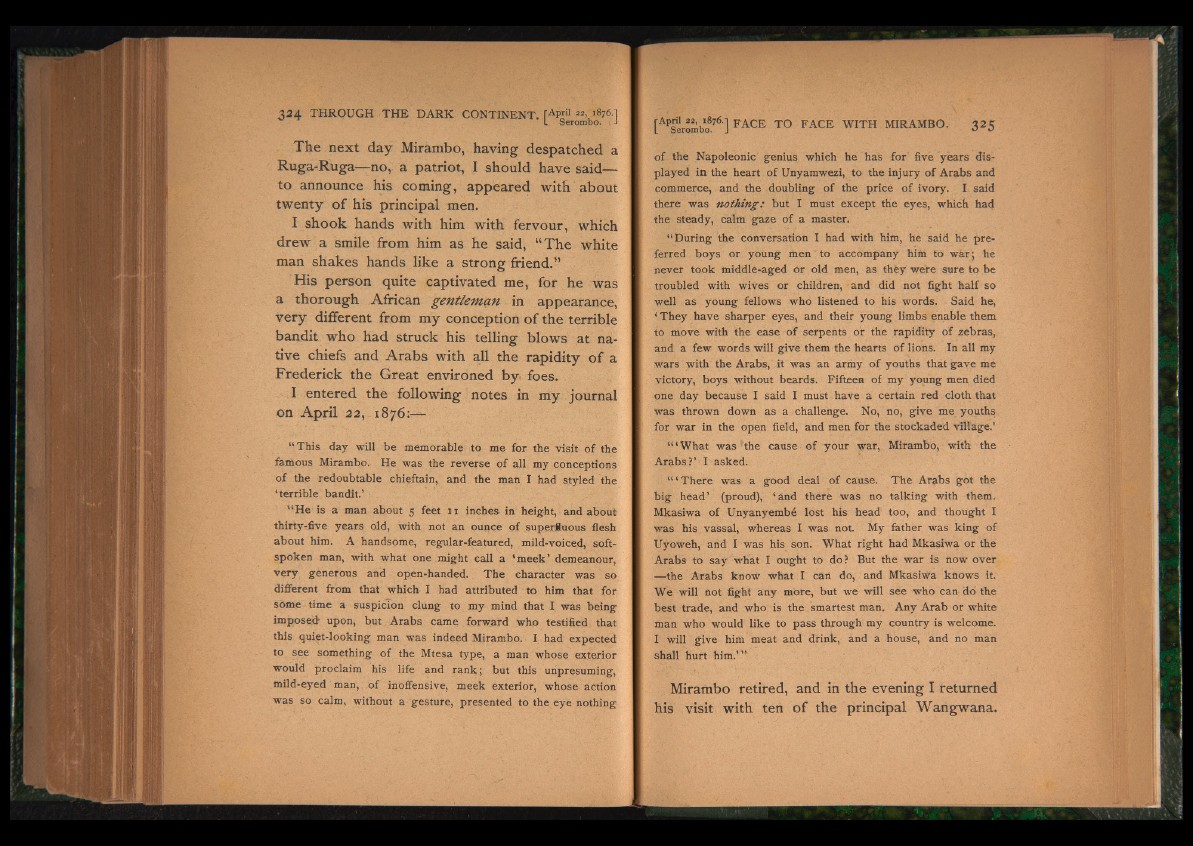
T he next day Mirambo, having despatched a
Ruga-Ruga— no, a patriot, I should have said—
to announce his coming, appeared with about
twenty o f his principal men.
I shook hands with him with fervour, which
drew a smile from him as he said, “ T he white
man shakes hands like a strong friend.”
His person quite captivated me, for he was
a thorough African gentleman in appearance,
v e ry different from my conception o f the terrible
bandit who had struck his telling blows at native
chiefs and A ra b s with a.11 the rapidity o f a
Frederick the Great environed by. foes.
I entered the following notes in my journal
on A p r il 22, 1876:-^
“ This day will be memorable to me for the visit of the
famous Mirambo. He was the reverse of all my conceptions
of the redoubtable chieftain, and the man I had styled the
‘ terrible bandit.’
' ‘He is a man about 5 feet ix inches in height, and about
thirty-five years old, with not an ounce of superfluous flesh
about him. A handsome, regular-featured, mild-voiced, soft-
spoken man, with what one might call a ‘meek’ demeanour,
very generous and open-handed. The character was so
different from that which I had attributed to him that for
S dm e time a suspicion clung to my mind that I was being
imposed* upon, but Arabs came forward who testified that
this quiet-looking man was indeed Mirambo. I had expected
to see something of the Mtesa type, a man whose exterior
would proclaim his life and rank ; but this unpresuming,
mild-eyed man, of inoffensive, meek exterior, whose action
was so calm, without a gesture, presented to the eye nothing
of the Napoleonic genius whieh he has for five years displayed
in the heart of Unyamwezi, to the injury of Arabs and
commerce, and the doubling of the price of ivory. I said
there was nothing: but I must except the eyes, whicix had
the steady, calm gaze of a master.
“ During the conversation I had with him, he said he preferred
boys or young men to accompany him to war; he
never took middle-aged or old men, as they were sure to be
troubled with wives or children, and did not fight half so
well as young fellows who listened to his words. Said he,
1 They have sharper eyes, and their young limbs enable them
to move with the ease of serpents or the rapidity of zebras,
and a few words will give them the hearts of lions. In all my
wars with the Arabs, it was an army of youths that gave me
victory, boys without beards. Fifteen of my young men died
one day because I said I must have a certain red cloth that
was thrown down as a challenge. No, no, give me youths
for war in the open field, and men for the stockaded village.*
“ ‘What w a s ’the cause of your war, Mirambo, with the
Arabs?’ I asked.
‘“ There was a good deal of cause. The Arabs got the
big head’ (proud), ‘ and there was no talking with them.
Mkasiwa of Unyanyembe lost his head too, and thought I
was his vassal, whereas I was not My father was king of
Uyoweh, and I was his son. What right had Mkasiwa or the
Arabs to say what I ought to do ? But the war is now over
— the Arabs know what I can do, and Mkasiwa knows it.
We will not fight any more, but we will see who can do the
best trade, and who is the smartest man. Any Arab or white
man who would like to pass through my country is welcome.
I will give him meat and drink, and a house, and no man
shall hurt him.’ ”
Mirambo retired, and in the evening I returned
his visit with ten o f the principal Wangwana.